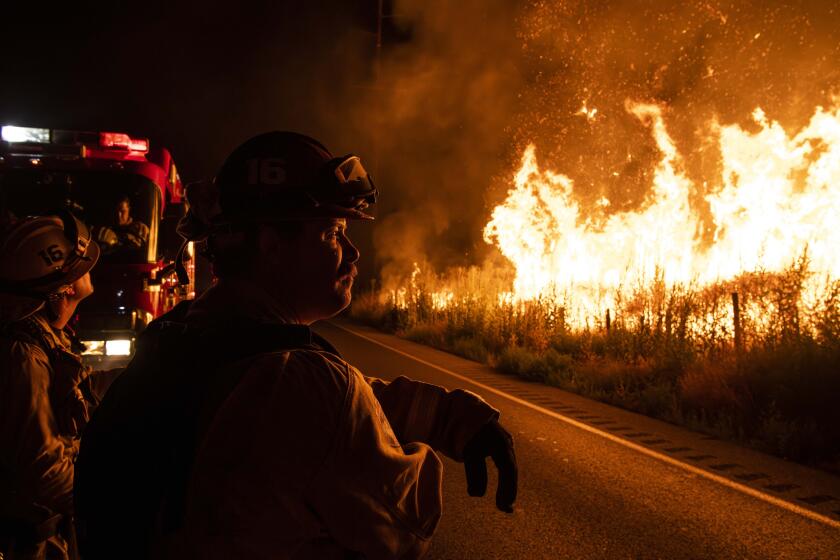Woo Urges Tighter Permit Rules to Forestall Forgery
- Share via
The discovery of a possible forgery on a Los Angeles city building permit prompted City Councilman Michael Woo Thursday to suggest that the city’s permit-approval process be tightened to prevent “fraud and external manipulation.”
Woo said that he was informed several days ago of a suspected forgery on a building permit issued in August for a construction project in his Hollywood district.
“I see this . . . as a catalyst for change, forcing us to look at the entire system and to make the changes necessary,” Woo said at a press conference with Planning Director Kenneth Topping.
It is the signature of one of Topping’s key aides, Richard Gervais, that may have been forged on a building permit authorizing construction of a 54-unit apartment complex at 1302-1322 N. Cherokee Ave. Part of the property has been designated for years as the site of a future park.
Gervais has told The Times that he reported the “obvious forgery” of his signature to Topping when he discovered the problem in about early October.
Topping said that he was “distracted” by other matters at that time, including Proposition U, the Nov. 4 ballot measure that placed limits on new commercial development in Los Angeles. This week, after an inquiry by The Times, Topping moved to revoke the permit.
Mayor Tom Bradley said that he is satisfied that Topping and other top city officials who were informed of the possible forgery six to eight weeks ago acted in a “timely fashion.”
Topping said at the press conference Thursday that he is now trying to “air out the facts on the forgery issue” by requesting his employees to submit to a handwriting analysis by an expert from the Los Angeles Police Department.
Depending upon the results of the investigation into Gervais’ signature, Topping said the city’s permit approval process may need overhauling. As it now exists, he said, “there is the opportunity for unscrupulous individuals . . . to use . . . the signature of any city official in an unauthorized manner.”
In an interview Thursday, Planning Commissioner Daniel P. Garcia agreed that the system is flawed. “The system has to be changed,” Garcia said, adding that he is hopeful that action can be taken “within 90 days.”
Under the current rules, Topping and Woo explained, an individual seeking permission for a construction project is responsible for physically carrying his building permit application from one city department to the next to obtain critical sign-offs of the project from various officials. When all the necessary signatures have been collected, the Department of Building and Safety issues a permit.
“The building department normally looks at the signature” to see if it is that of “the person they know to be authorized to sign,” Topping said. But it is hard to tell sometimes. Confusion can be created, he said, by a practice in the planning department by which staffers are in some instances authorized to sign, and then initial, a superior’s name.
“We’re going to change that,” Topping said. “We’re going to modify signature authorizations (so that) an individual must sign for themself.”
Woo said that more drastic changes may also be required in the “mundane but important” permit-granting process.
Especially troublesome, he said, is the practice of applicants gathering signatures from city officials by “carrying the paper work around” to various city agencies.
“This practice was instituted as a cost-saving measure so that city employees didn’t have to be responsible for getting the permit application from point A to point B,” Woo said. “Now, we see the possible opportunity for fraud and abuse.”
Woo said he will ask City Council members Marvin Braude, head of the council Building Committee, and Pat Russell, head of the Planning Committee, “to do a joint investigation” of permit-approval procedures. “I question whether the holes in the filter are fine enough.”
Meanwhile, former City Councilman Arthur K. Snyder, who is representing the Cherokee Avenue property owner, Joseph Su, said that he is going to try to see if there is a way to “legalize” his client’s permit.
Snyder, who was hired after Su obtained the building permit, said last week that he had been told in October by a planning official whose name he cannot remember that the permit was valid, regardless of who signed Gervais’ name.
He said Thursday that this decision was reversed, presumably because the matter was “looked at again . . . by people at a higher level.”
Snyder said he will file an appeal on Su’s behalf in an effort to prevent the revocation of the permit while he tries to see if there is a way to validate it.
“If (it) can be validated, we’d like to,” Snyder said.
Snyder added that his client has invested $700,000 in the property at the intersection of Fountain and Cherokee avenues with the expectation that he would be able to build an apartment complex.
If he is barred, Snyder said, the consequences will be “tragic,” causing financial ruin for him and his relatives in Taiwan.
More to Read
Sign up for Essential California
The most important California stories and recommendations in your inbox every morning.
You may occasionally receive promotional content from the Los Angeles Times.










